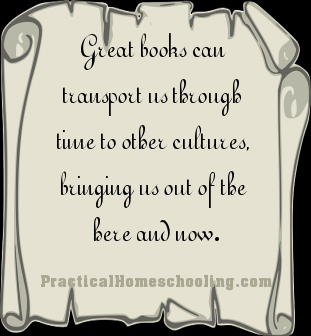 Even though the modern world seems to be increasingly capable of bringing us into contact with many different cultures on a daily basis, many people seem to be more culturally narrow than ever. Even educators seem to think that without appealing to narrowest of students' provincial prejudices, they have no chance of engaging them. This narrowness is often displayed by the fact that our textbooks are full of pictures of young students dressed in the latest styles, engaged in trendy recreations, and (of course) all the exact same age as the students the books are written for.
Even though the modern world seems to be increasingly capable of bringing us into contact with many different cultures on a daily basis, many people seem to be more culturally narrow than ever. Even educators seem to think that without appealing to narrowest of students' provincial prejudices, they have no chance of engaging them. This narrowness is often displayed by the fact that our textbooks are full of pictures of young students dressed in the latest styles, engaged in trendy recreations, and (of course) all the exact same age as the students the books are written for.
All of these accommodations give the students the impression that "everyone is just like me." If we give children an education that reinforces their sense that indeed there is nothing beyond their current horizons, we can be sure they will spare the pains entailed in setting forth to see for themselves. When we allow them to listen to "Jars of Clay" while doing their math homework, ask them to compare and contrast the Special Edition and original versions of Star Wars for their composition exercise, and then give them the biography of Orel Hershiser for their reading, we are simply ensuring that our students will be simply ill-equipped to deal with any mental challenges that do not come pre-packaged in a contemporary cultural context.
How can we train up children who will not be bound to their immediate cultures, but free to move among other cultures without being plagued by the usual "culture-shock?" Even though education should not teach us to look down upon our own culture, it should give us the ability to step outside it and be free to critique it. Children need to be given many opportunities to venture beyond their habitual mental ruts and taste of the broad world that is theirs to explore. Without the fresh air and strong winds that such experience affords, they will never develop the mental strength required to grasp the complicated delights cosmopolitan culture offers.
Modern champions of "multiculturalism" have attempted to prepare students to respect differing cultures by exposing them to various beliefs and practices found in other cultures. By having students celebrate Cinco de Mayo and Kwanzaa, it is thought they will gain the ability to appreciate the richness of life that is available beyond our own immediate culture. However, most of these efforts are fairly ineffective because mere exposure rarely produces true respect.
The Great Escape
In order to pull children out of their myopic devotion to the present and immediate, they need to be shown that there are ideas from other times and peoples that speak to them of truths that are actually profound and exciting. They will not find this in works that are presented to them simply as an exercise in cultural diversity; rather, they need to put their minds upon literature and artistic works that were created to address themes that have universal significance.
Because it is possible to address in writing those universal and fundamentally human questions, there can be such a thing as a "great book." A great book does not need to demand that you respect it because of some bogus literary affirmative-action program; it brings its own persuasive powers. A great book can stand of its own accord outside the claims of "tribal respect." In fact, great literature often debunks the respect for our individual ethnic tribes that multicultural pundits propound.
Books provide us with the quickest and cheapest means of escaping 1997. Books not only force us to see the world through the spectacles of another time, but they also transport us to many other cultures that are often radically different from our own. Every culture has its great literature with enduring worth, and anyone who is well studied in the great literature of one will find making themselves at home in the literature of another that much easier.
Good literature should teach us to think beyond our immediate culture. Indeed, to be truly Christian, it is essential that we learn to detach ourselves from the truth-claims that our immediate culture presses upon us. Not being able to distinguish what is merely cultural from what is truly universal will be disastrous for our attempts to preach the gospel cross-culturally. A Christian mind that is not practiced in the skills necessary to discern the difference between culture-bound Christianity and the fundamental truths of the faith is ill-suited to effectively share the gospel with those from other cultures. As missionaries of Christ, we must be able to separate what is fundamental from what is simply a cultural accessory.
The temptation to remain stuck in the pop-cultural rut cannot be overcome without the aid of high culture. We do have a culture-shaped vacuum in our souls that will be filled with some aesthetic. If we desire to raise up children who can move outside their culture, we will do well to raise them up on a literary diet that continually forces them to fill themselves with what is universal rather than narrowly contemporary.